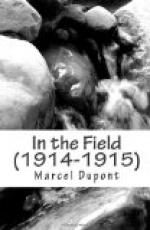The day has been absolutely quiet, however. After the fighting of the day before, and a night of sleeplessness and incessant alarms in the trenches, three of our squadrons, mine among them, were relieved before dawn and placed in reserve. They found billets in little forsaken farms some 600 yards from the firing line. Our men rested as well as they could all day, making beds of the scanty supplies of straw they found, washing themselves in pools, and renewing their strength in order to relieve the troops which had remained in the trenches; a squadron of our regiment, a squadron of the —— Chasseurs, and a section of infantry Chasseurs.
Seated on a broken box, I was doing my best to write a letter, while Major B. and my brother officers O. and F., together with Captain de G., of the third squadron, took their seats at a rickety table and began a game of bridge. Here, by the way, is a thing passing the understanding of the profane, I mean the non-bridge player. This is the extraordinary, I might almost say the immoderate, attraction which the initiated find in this game, even at the height of a campaign. What inexhaustible joys it must offer to make its adepts profit by the briefest moments of respite in a battle to settle down anywhere and anyhow and give themselves up to their mysterious practices!
I pause for a moment in my letter-writing to enjoy the sight, which has its special charm. Two or three kilometres off, towards Steenstraate, the cannon were working away furiously, while only a few paces from our shanty a section of our 75’s was firing incessantly over the wood upon Bixschoote; overhead we heard the unpleasant roar of the big German shells; and in the midst of the racket I saw my bridge players dragging their table over to the broken window. Day was dying, and we had not seen a gleam of sunshine since morning. The sky was grey—a thick, dirty grey; it seemed to be very low, close upon us, and I felt that the night would come by slow degrees without any of those admirable symphonies of colour that twilight sometimes brings to battlefields, making the combatant feel that he is ending his day in apotheosis.
But those four seemed to hear nothing. In the grey light I watched the refined profile of the Major bending over the cards just dealt by F. He no doubt has to speak first, for the three others looked at him, in motionless silence, as if they were expecting some momentous utterance. Then suddenly, accompanied by the muffled roar of the battle music, the following colloquy took place, a colloquy full of traps and ambushes, I suppose, for the four officers cast suspicious and inquisitorial glances at each other over their cards:
“One spade.”
“Two hearts.”
“Two no trumps.”
“I double.”
“Your turn, Major.”




